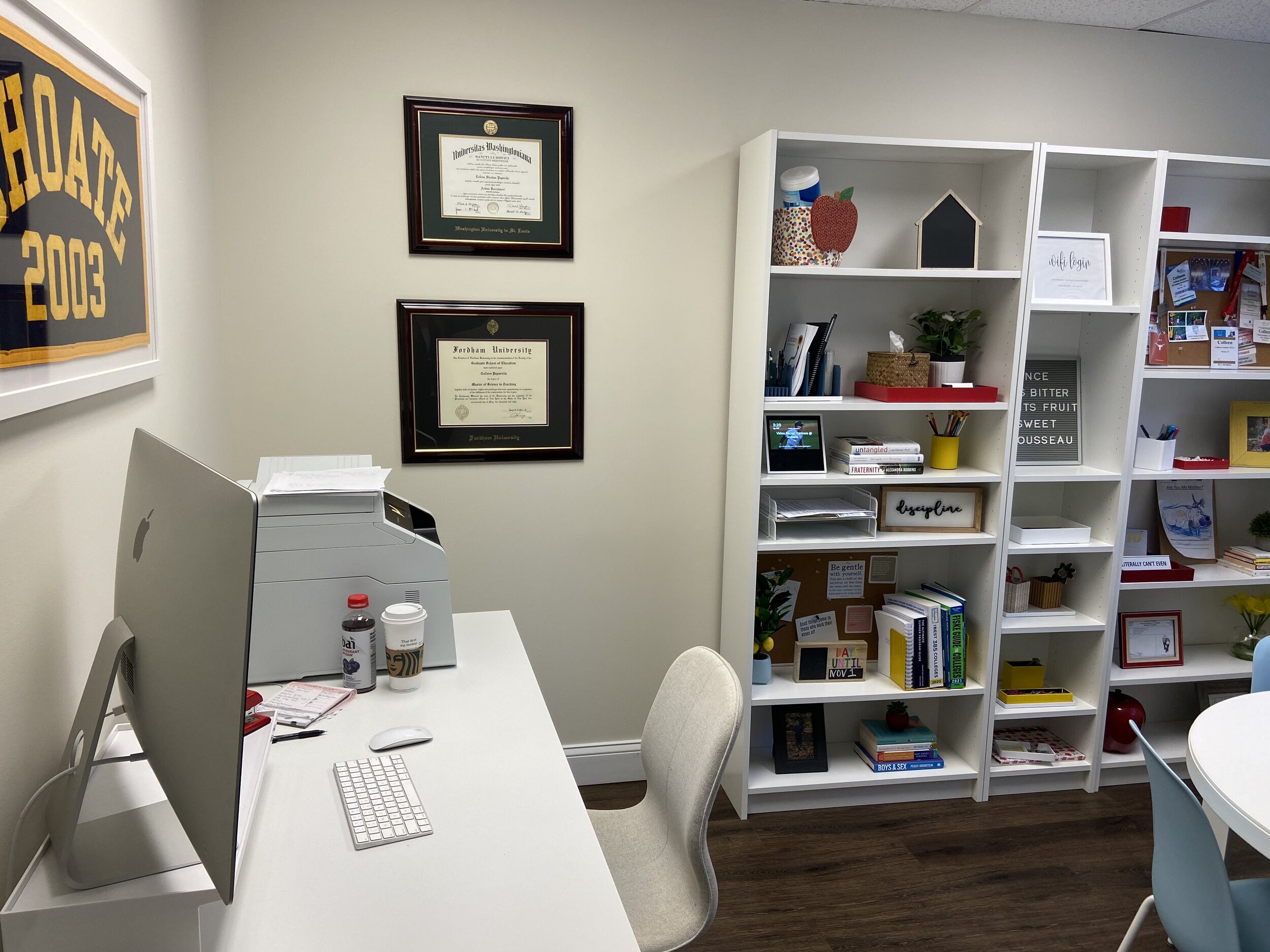We’ve gotten SO much positive feedback from our new internship database - keep watching for more listings each week, because we have a whole bunch of great ones on the pipeline! So far, you can see our January 14 listings here and our January 7 listings here.
Several families have asked whether resume and interview preparation for the college application process can also carry over to the internship and job application process. Is it basically the same?
Great question, and the answer is “yes and no.” Here’s a breakdown for you:
Creating a Resume
College Admissions
The resume must be one page long at the absolute max and should have a clean format that is easy to read (and easy to skim!). It should provide a general overview of the student’s greatest accomplishments and other need-to-know information, grouped into sections with headings. All of our clients have a sample template in their Google Drive folders, and non-clients can purchase a low-cost editable instant download of the same template here.
Job/Internship
The format should be very similar to the admissions resume in that it should not exceed one page and should be easy to read and skim. It should also be grouped into sections and headings. However, it should not be general in nature - it should be tailored to the position as much as possible and should highlight experiences that coincide with the job duties.
BRINGING a Resume
College Admissions
It’s not absolutely necessary for students to bring a resume to a college interview if they don’t have one prepared already. Most of the interviewers will not read the resume; however, if students have one prepared or are willing to put some time into creating one, they should go ahead and take it with them. It will only help project a positive impression!
Job/Internship
Students must always, always, always bring a resume with them to a job interview--even if they have emailed it to the employer ahead of time! No way around this. They should bring several copies in a portfolio or folder to ensure that they do not become dirty or crumpled en route to the interview.
Interview Preparation
College Admissions
As many of our students know, interview preparation for a college admissions interview is essential! A few of the tasks we cover in our interview prep sessions include developing answers to common interview questions, writing questions to ask the interviewer that show research and interest, perfecting a handshake, and practicing eye contact. We also advise several practice rounds with one of our staff members or a parent; this will help students learn to answer questions on the spot while maintaining a professional approach (it will also help to eliminate fillers like “um” and “like”).
Job/Internship
Just like college interviews, job interviews require preparation. Many of the skills from college interview work will help with job and internship interviews, such as sustained eye contact, a strong handshake, and a professional approach. It’s also critical to practice answers to common questions and arrive to the interview with questions that show research and interest; however, the nature of all of these questions will be completely different.
Interview Attire
College Admissions
College interviews usually require business casual attire. This can mean a nice dress or pants with a blazer or sweater for girls, or nice pants with a button-down shirt for boys. No leggings, athletic wear, or jeans! Girls should pay attention to their shoes to make sure that they are able to walk comfortably and that they are not wearing a heel that is too high. All clothes should be clean and pressed, and fit well. Nothing too tight or too baggy, and certainly nothing that could be considered even remotely objectionable. Boys should make sure to have had a haircut recently and girls should have their hair styled away from their face in a polished way. No heavy makeup, perfume, or cologne. When in doubt, students should ask themselves it their outfit would be appropriate to attend a religious service at a grandparent’s retirement home. If the answer is yes, that’s a good sign!
Job/Internship
Job and internship interviews are a little trickier because it very much depends on the job. It would be strange to walk into Starbucks in a suit for an interview, but it would also be inappropriate to walk into a corporate internship full of men and women in suits while wearing a pair of khakis. Regardless, however, it’s always best to look your best for a first impression. We recommend trying to get a sense of the typical office attire of the workplace and going for one or two notches above that, if it’s more of a casual setting. All grooming-related tips from the college interview still apply.
Interview Scheduling and Timing
College Admissions
Students should plan interviews far ahead of time--this ensures appropriate preparation and it also shows interest in the school! Plus, some schools’ interview slots that fill up relatively quickly - like William & Mary’s summer interview schedule. On the day of the interview, it’s best to arrive no earlier than 15-20 minutes in advance and no later than 5 minutes in advance.
Job/Internship
Timeliness is equally important for job and internship interviews. Unlike college interviews, however, students don’t just “sign up” and interviews aren’t extended to all applicants. It actually plays out in the opposite manner! Instead, students first need to submit an application if one exists (typically this is the case for internships) and/or submit a resume and cover letter. Students should be sure to read the specific instructions in the listing, which may be very different from position to position.
Whether it is a job or an internship, interviews are typically only granted after the organization has reviewed the student’s materials and decided that the student meets the position’s initial qualifications. If the organization is interested in interviewing a student, a representative will typically invite the student to come in and may suggest a set of times. On the day of the interview, follow the same advice regarding timing - no more than 15-20 minutes in advance and no later than 5 minutes in advance.
Interview Questions
College Admissions
Admissions officers or alums will certainly ask students questions about their academic history and plans for the future, extracurricular activities (volunteer, arts, sports, etc.), and their interest in attending that particular school. Some interviewers may ask students to describe themselves or how others would describe them. They’re trying to get an overall sense of the student’s work ethic, their dedication to things outside of school, and their overall personality - as well as their likelihood of attending the school if admitted. A lot of that will come out through the rapport the student has with the interviewer, but it’s extremely helpful to prepare for questions so that students have answers in mind for every possible question! Anyone needing more help with this can pick up our College Interview Guide. Current clients can download this from our shared documents site (see your passwords document for login access).
Job/Internship
Job and internship interview questions are typically not as focused on extracurriculars and academics, although this can vary depending on the position. Instead, most questions typically revolve around student experience with the duties that the position entails. One of our coaches, Megan, was recently sharing a story with a student about how she had unsuccessfully applied for a job at Anthropologie while she was in high school. She had a great academic history and plenty of experience in childcare, but nothing in retail.
In retrospect, she explained, she should have pulled from what she had and tried to connect the skills that made her successful in school and babysitting to skills that would make her a great employee at Anthropologie. This would have been much more effective than talking about how she was a great babysitter. Even students starting from a place with no work experience can try to connect what they have learned from academic and extracurricular experiences to the day-to-day duties of the position at hand.
Lastly, just like preparing for the “Why this school?” college interview question, students need to have well-researched and thought-out answers regarding why the particular job and internship is appealing to them.
—-
As you can see, there’s a lot of overlap between the college application process and the job/internship application process, but not enough to bypass dedicated preparation for the latter. Remember that parents can often provide great support in helping to segue from interviews and resumes geared towards the college admissions process to those geared towards jobs and internships.
If you’d rather come in to work with a team member, we have options available for both current clients and those who are not working with us on an ongoing basis but just need a little help in this area.

























